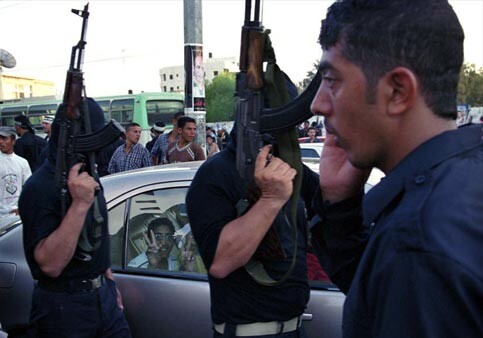The Electronic Intifada 2 October 2005

A show of force in Gaza. (Photo: Ronald de Hommel)
Bethlehem — While average Palestinians celebrate Israel’s withdrawal in the streets of the Gaza Strip, the minds of ranking Palestinian leaders are distracted by the implications of this development.
Along with inheriting a drastically impoverished, underdeveloped and overpopulated piece of land, the Palestinian Authority (PA) will face serious challenges in governing Gaza’s rebellious and factionalized population. The PA faces tremendous pressure from Israel and the international community to ensure stability, economic development and security in the Strip following the completed evacuation. Understanding that the post-withdrawal situation in Gaza will greatly affect the future of negotiations, PA leaders have outlined curious plans to ensure success.
The majority of Gazans are loyal to the Islamic Resistance Movement (Hamas) which has, with little exception, fulfilled their basic needs during the worst years of the Israeli occupation. Due to its less-than-perfect record in protecting the public interest, the Fatah movement, of which the PA is largely comprised, has become synonymous in the minds of many Palestinians with corruption and duplicity. This perception is reflected in Fatah’s inferior support network inside the Gaza Strip.
Facing Hamas, an adversary that reputable security analysts predict could defeat PA security forces in a military confrontation, PA officials have posited the idea of transferring thousands of armed Palestinian refugees from Lebanon to the Gaza Strip. In early August, the London-based al-Hayat newspaper reported the possible plan, indicating that such a contingent would create a “neutral” force in Gaza as well as alleviate suffering the refugees endure in Lebanon’s notorious camps.
Many of Lebanon’s battle-hardened Palestinians acquired extensive military training and fighting experience during Lebanon’s fourteen year civil war. The brutal interfactional fighting that defined the war left Palestinian militias with operational knowledge of high intensity guerilla warfare, skills that could be easily put to use in any venue.
Many of Lebanon’s Palestinian refugees come from northern areas of the former Palestinian mandate. Conversely, the refugees in Gaza have their historical roots mainly in the southern and central areas of modern Israel. The geographic separation between the groups means that clan and familial connections between them are nominal. In a culture that generally frowns on intrafamilial conflict, the disconnect between the groups will make it less difficult for them to engage in violent confrontations. Such a large group of armed and trained fighters in the Gaza Strip will inevitably play a role in emergent conflicts, namely the one between the Fatah controlled PA and Hamas.
While the PA bills the prospective “return” of Lebanese-Palestinian refugees as a humanitarian effort to which it awards “top priority,” it is clear that pragmatic concerns are at play. In what is sure to be a power play between the Fatah-controlled PA and Hamas in a post-withdrawal Gaza Strip, the understaffed, poorly trained PA security forces are in desperate need of allies. Of the numerous neighboring countries in which Palestinian refugees live in squalor, the PA appears uniquely fixated on importing Lebanon’s battle hardened Palestinians, many of whom are not overly excited to “return” to the Gaza Strip.
One can assume that the return of Lebanese-Palestinian refugees will be preceded by meticulous screening of political affiliations and history. The PA will, as a matter of first priority, transfer those refuges whose histories demonstrate allegiance to the Fatah movement, which was highly involved in the Lebanese civil war under the control of the late Yassir Arafat. These refugees, with limited familial connections to Gazans, demonstrated allegiance to Fatah and extensive military experience, will provide the supplemental fighting force that the PA security forces so desperately needs to consolidate power in the Strip. While such a development may serve the short-term security interests of the PA in its struggle to marginalize Hamas, it also has the potential to turn the newly “liberated” Strip into a complicated arena of militia warfare.
Peter Muller is an editor at the Ma’an News Agency in Bethlehem, Palestine. He arrived in the West Bank in May 2005 and began work with Ma’an in June. He is a graduated from the American University in Washington D.C. where he studied the history of ethnic conflict and genocide.



